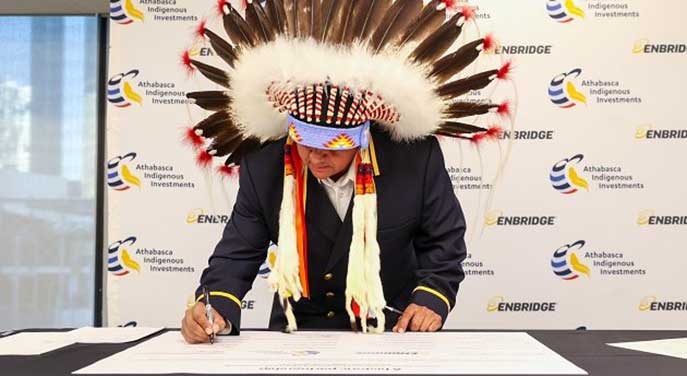 A massive milestone has been reached in the growing trend of Indigenous people taking ownership of Canadian oil and gas projects.
A massive milestone has been reached in the growing trend of Indigenous people taking ownership of Canadian oil and gas projects.
Twenty-three First Nations and Métis communities in northern Alberta are investing $1.1 billion to become part owners of seven Enbridge oil sands pipelines. It’s described as the largest energy-related Indigenous partnership transaction in North America, and the opportunities it creates can’t be overstated, according to Frog Lake First Nation Chief Greg Desjarlais.
“It’s going to allow us to send our kids to school. It’s going to allow us to send our people to treatment. It’s going to allow us to deal with the mental [health] crisis that we have in our communities, the anxiety of the young people. It’s going to allow us to improve the quality of life,” he said during a press conference on Wednesday.
“[It’s] going to impact the lives of the children that are yet to come, of our elderly people that need their power and gas paid that maybe did not pay into a pension plan, to house people in new homes and have roads created, and maybe one day have services where we can all enjoy water by turning on a tap instead of it having to be delivered by a truck every few days.”
 Frog Lake First Nation Chief Greg Desjarlais takes part in a signing ceremony between Enbridge and 23 Indigenous communities for equity ownership in seven oil sands pipelines |
| Related Stories |
| Indigenous people ready to do business with oil and gas
|
| Indigenous peoples faced with a choice of development or poverty
|
| Proposed emissions cap will hurt Indigenous economies |
Frog Lake First Nation, located about 300 km northeast of Edmonton, has a population of about 3,300. Desjarlais said the community receives just $234,000 for housing through federal government programs.
“Now everybody knows why we struggle with mould [and] overcrowding,” he said. “Today marks the beginning of a new path for our people.”
Through a new company called Athabasca Indigenous Investments, communities will hold an 11.57 per cent ownership stake in pipelines that transport about 45 per cent of Canadian oil sands production.
That’s about 1.3 million barrels per day as of 2021, according to Alberta Energy Regulator data.
The deal may be the largest, but it’s not the first. There are numerous examples today of Indigenous ownership partnership agreements in Canadian oil and gas, including:
- Astisiy: Eight Indigenous communities partnered with Suncor Energy to purchase 15 per cent ownership of the Northern Courier Pipeline
- East Tank Farm: Fort McKay and Mikisew Cree First Nations acquired 45 per cent ownership of Suncor’s Fort Hills East Tank Farm
- Coastal GasLink: 16 Indigenous communities along the pipeline route in B.C. will jointly own 10 per cent of the project when it is completed
- Cedar LNG: The Haisla Nation on the B.C. coast is 50 per cent owner of the proposed Cedar LNG project along with Pembina Pipeline Corporation
- Ksi Lisims LNG: The Nisga’a Nation, also on the B.C. coast, jointly owns the proposed Ksi Lisims LNG project with partners Rockies LNG and Western LNG
Ownership of resource projects is a solution to the high levels of poverty that plague Indigenous communities across Canada, says Robert Merasty, executive director of the Indigenous Resource Network (IRN).
Merasty praised the new Enbridge deal but said more work still needs to be done.
“Probably 99 per cent of the time, bands don’t have the necessary capital to get into those projects,” he said.
The IRN is calling on the federal government to establish a national Indigenous guaranteed loan program to enable resource project ownership agreements.
“We need a national program, like the (Alberta Indigenous Opportunities Corporation) AIOC, so that agreements like this can take place all over Canada,” Merasty said. (The AIOC provided a $250 million loan guarantee to back the new deal with Enbridge.)
Indigenous leaders are also concerned about the impact on their growing prosperity of Ottawa’s plan to cap and reduce emissions from the oil and gas industry by 42 per cent in the next eight years.
“We finally have a seat at the table, and now it’s like the food is being pulled away from us,” Karen Ogen-Toews, CEO of the First Nations LNG Alliance, said in a September webinar.
Deborah Jaremko is director of content for the Canadian Energy Centre, an Alberta government corporation funded in part by taxes paid by industry on carbon emissions.
For interview requests, click here.
The opinions expressed by our columnists and contributors are theirs alone and do not inherently or expressly reflect the views of our publication.
© Troy Media
Troy Media is an editorial content provider to media outlets and its own hosted community news outlets across Canada.

